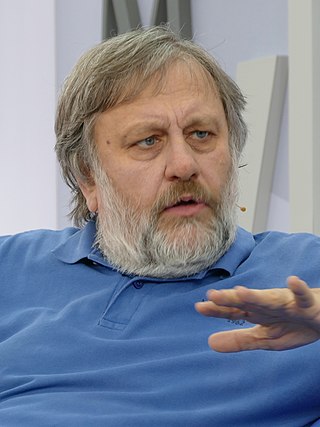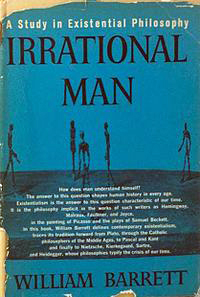The following outline is provided as an overview of and topical guide to critical theory:

Existentialism is a family of philosophical views and inquiry that prioritize the existence of the human individual, study existence from the individual's perspective, and conclude that, despite the absurdity or incomprehensibility of the universe, individuals must still embrace responsibility for their actions and strive to lead authentic lives. In examining meaning, purpose, and value, existentialist thought often includes concepts such as existential crises, angst, courage, and freedom.

Slavoj Žižek is a Slovenian philosopher, cultural theorist and public intellectual.
In the 19th century, the philosophers of the 18th-century Enlightenment began to have a dramatic effect on subsequent developments in philosophy. In particular, the works of Immanuel Kant gave rise to a new generation of German philosophers and began to see wider recognition internationally. Also, in a reaction to the Enlightenment, a movement called Romanticism began to develop towards the end of the 18th century. Key ideas that sparked changes in philosophy were the fast progress of science, including evolution, most notably postulated by Charles Darwin, Alfred Russel Wallace and Jean-Baptiste Lamarck, and theories regarding what is today called emergent order, such as the free market of Adam Smith within nation states, or the Marxist approach concerning class warfare between the ruling class and the working class developed by Karl Marx and Friedrich Engels. Pressures for egalitarianism, and more rapid change culminated in a period of revolution and turbulence that would see philosophy change as well.
Continental philosophy is an umbrella term for philosophies prominent in continental Europe. Michael E. Rosen has ventured to identify common themes that typically characterize continental philosophy. These themes proposed by Rosen derive from a broadly Kantian thesis that knowledge, experience, and reality are bound and shaped by conditions best understood through philosophical reflection rather than exclusively empirical inquiry.
Social philosophy examines questions about the foundations of social institutions, behavior, power structures, and interpretations of society in terms of ethical values rather than empirical relations. Social philosophers emphasize understanding the social contexts for political, legal, moral and cultural questions, and the development of novel theoretical frameworks, from social ontology to care ethics to cosmopolitan theories of democracy, natural law, human rights, gender equity and global justice.
"God is dead" is a statement made by the German philosopher Friedrich Nietzsche. The first instance of this statement in Nietzsche's writings is in his 1882 The Gay Science, where it appears three times. The phrase also appears at the beginning of Nietzsche's Thus Spoke Zarathustra.

Walter Arnold Kaufmann was a German-American philosopher, translator, and poet. A prolific author, he wrote extensively on a broad range of subjects, such as authenticity and death, moral philosophy and existentialism, theism and atheism, Christianity and Judaism, as well as philosophy and literature. He served more than 30 years as a professor at Princeton University.
Existential phenomenology encompasses a wide range of thinkers who take up the view that philosophy must begin from experience like phenomenology, but argues for the temporality of personal existence as the framework for analysis of the human condition.
French philosophy, here taken to mean philosophy in the French language, has been extremely diverse and has influenced Western philosophy as a whole for centuries, from the medieval scholasticism of Peter Abelard, through the founding of modern philosophy by René Descartes, to 20th century philosophy of science, existentialism, phenomenology, structuralism, and postmodernism.
Freudo-Marxism is a loose designation for philosophical perspectives informed by both the Marxist philosophy of Karl Marx and the psychoanalytic theory of Sigmund Freud. Its history within continental philosophy began in the 1920s and '30s and running since through critical theory, Lacanian psychoanalysis, and post-structuralism.

Irrational Man: A Study in Existential Philosophy is a 1958 book by the philosopher William Barrett, in which the author explains the philosophical background of existentialism and provides a discussion of several major existentialist thinkers, including Søren Kierkegaard, Friedrich Nietzsche, Martin Heidegger, and Jean-Paul Sartre. Irrational Man helped to introduce existentialism to the English-speaking world and has been identified as one of the most useful books that discuss the subject, but Barrett has also been criticized for endorsing irrationality and for giving a distorted and misleading account of Georg Wilhelm Friedrich Hegel.
20th-century French philosophy is a strand of contemporary philosophy generally associated with post-World War II French thinkers, although it is directly influenced by previous philosophical movements.
Articles in social and political philosophy include:
Atheistic existentialism is a kind of existentialism which strongly diverged from the Christian existential works of Søren Kierkegaard and developed within the context of an atheistic world view. The philosophies of Søren Kierkegaard and Friedrich Nietzsche provided existentialism's theoretical foundation in the 19th century, although their differing views on religion proved essential to the development of alternate types of existentialism. Atheistic existentialism was formally recognized after the 1943 publication of Being and Nothingness by Jean-Paul Sartre and Sartre later explicitly alluded to it in Existentialism is a Humanism in 1946.
This is a list of articles in modern philosophy.
This is a list of articles in contemporary philosophy.